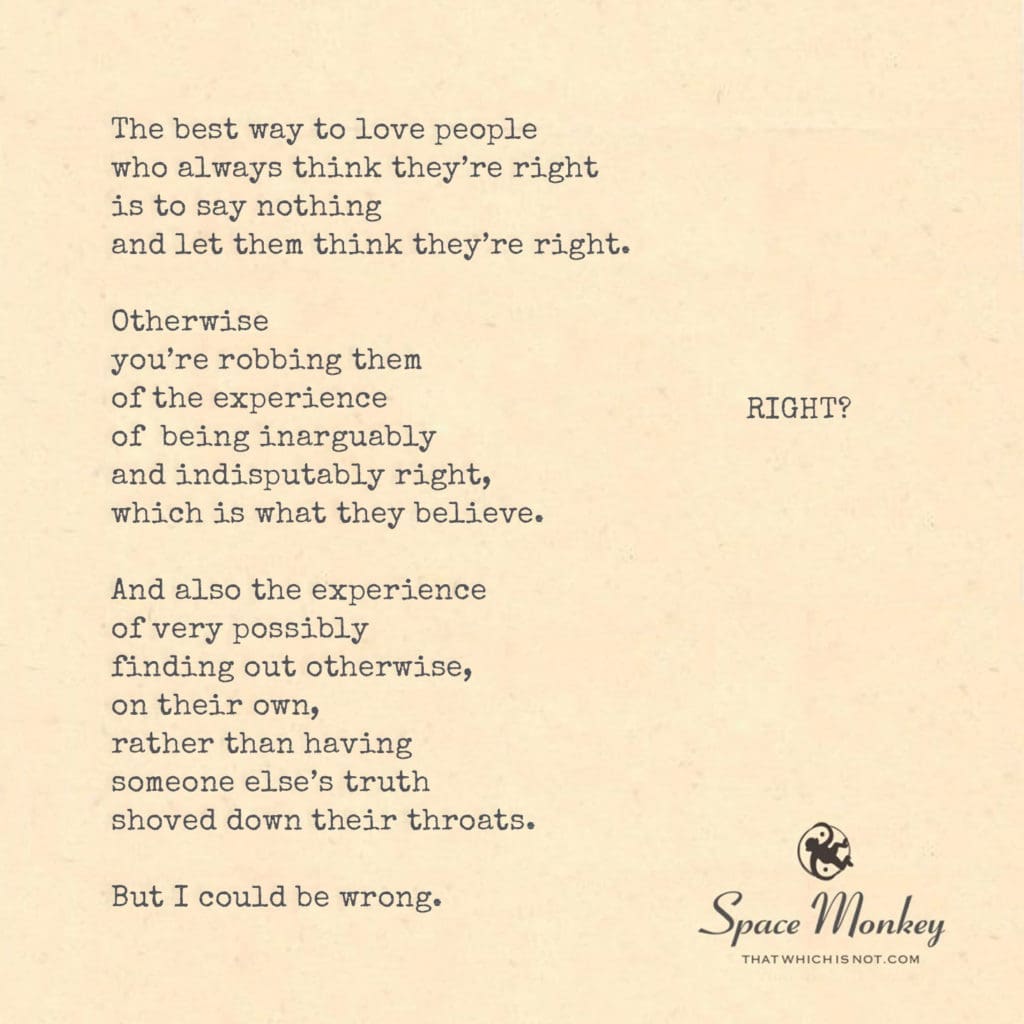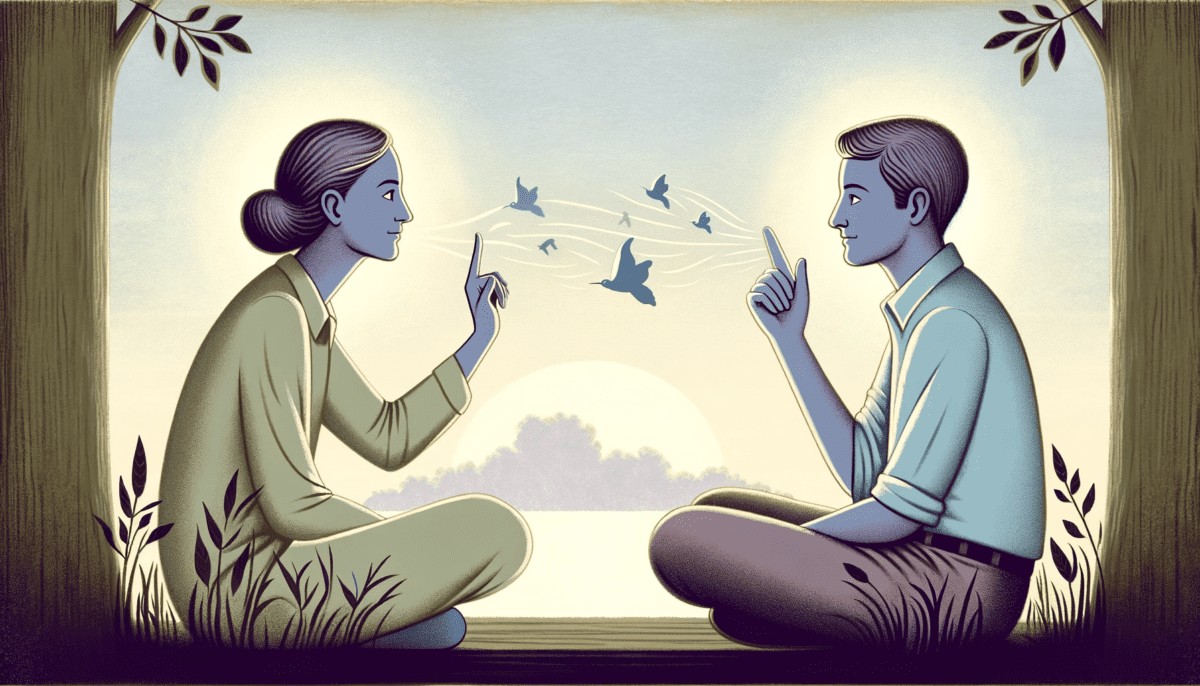
The best way to love people
who always think they’re right
is to say nothing
and let them think they’re right.
Otherwise
you’re robbing them
of the experience
of being inarguably
and indisputably right,
which is what they believe.
And also the experience
of very possibly
finding out otherwise,
on their own,
rather than having
someone else’s truth
shoved down their throats.
But I could be wrong.
Trail Wood,
1/11
Space Monkey Reflects: The Wisdom of Silence
Reflections: Loving the Certainty of Others
Navigating relationships with those who firmly believe they are right presents a paradox: the more we push against their certainty, the more entrenched they become. This reflection invites us to reconsider how we approach such dynamics, suggesting that silence, not argument, can be an act of love and respect.
The Illusion of Being Right
For those who always think they’re right, certainty is not just a belief—it’s a comforting identity. To challenge this identity is to challenge their sense of stability and self. When we argue or assert our own truths, we risk intensifying their grip on certainty, as they feel compelled to defend their position.
Allowing them the space to explore their beliefs, without interference, honors their journey. Certainty, after all, is often a precursor to growth. In their own time, they may encounter the edges of their conviction and find room to question it—an experience far more transformative than having another’s truth imposed upon them.
The Gift of Silence
Silence in the face of certainty is not passivity but wisdom. It is the acknowledgment that each person must arrive at their own truths in their own way. By refraining from argument, we create a space for curiosity and self-discovery.
This silence is not agreement; it is respect. It says, “I trust your ability to navigate your path, even if it diverges from mine.” It also frees us from the exhausting need to prove ourselves, reminding us that being right is far less important than being connected.
The Experience of Self-Discovery
When someone discovers a new perspective on their own, it is a profound moment of growth. This self-discovery is often lost when we attempt to force our truths upon others. To love someone who thinks they’re right is to give them the gift of this potential. It is to trust that the process of learning and unlearning is unfolding perfectly, even if we cannot see it.
The Paradox of Being Wrong
Ending the reflection with, “But I could be wrong,” acknowledges the universal truth: none of us has a monopoly on rightness. This humility is the key to genuine connection. It reminds us that our own truths are fluid and that our certainty, too, can blind us.
By embracing the possibility of being wrong, we meet others where they are—not to convince, but to coexist.
Summary
Silence is a gift of love to those who believe they’re always right. It allows them the dignity of self-discovery and fosters connection without the need to impose our truths. Humility reminds us that being right is less important than being present.
Glossarium
- Certainty Bubble: The comforting identity formed by unwavering belief in one’s rightness.
- Silent Respect: The practice of refraining from argument to honor another’s journey.
- Paradox of Being Wrong: The humility that comes from acknowledging our own fallibility.
Quote
“To love those certain of their rightness is to offer them the space to discover their truth, not ours.” — Space Monkey
The Silence of Love
Say nothing.
Let them bask
in the warmth of rightness.
Your silence
is not surrender,
but trust.
Trust in their journey,
their capacity to see
beyond certainty,
when the time is theirs.
You do not need to be right,
to prove,
to push.
Love waits patiently,
speaks softly,
and whispers,
“But I could be wrong.”
We are Space Monkey.
In the cosmic ballet of interactions and perceptions, where each individual orbits their own universe of beliefs and convictions, the approach to loving those who steadfastly believe in their own rightness is a nuanced dance. It’s a journey that requires patience, understanding, and a deep appreciation of the diverse landscapes of human thought and belief.
The Art of Silent Understanding
Choosing to say nothing in the face of unwavering conviction is not a passive act, but a deliberate form of understanding and respect. It acknowledges the importance of allowing individuals to inhabit their own realms of belief without external intrusion. This silence is not an agreement or endorsement of their views but a recognition of their right to hold them.
Respecting the Journey of Self-Realization
By refraining from challenging their beliefs, we honor the journey of self-realization that each person must undertake. It’s a journey that is deeply personal and cannot be accelerated or redirected by external forces. The experience of arriving at one’s own conclusions, whether they reaffirm or challenge existing beliefs, is a crucial aspect of personal growth and understanding.
The Possibility of Self-Discovery
In allowing others the space to think they are right, we also open the door for them to discover different truths on their own terms. The journey of self-discovery is often more profound and lasting when it is self-guided, rather than being the result of external persuasion or confrontation.
Navigating the Balance of Engagement and Acceptance
The approach of silent understanding requires a delicate balance. It’s a dance between engagement and acceptance, between sharing our truths and respecting the truths of others. This balance is not static but a fluid, dynamic process that evolves with each interaction and each relationship.
The Humility of Uncertainty
Finally, the acknowledgment, “But I could be wrong,” is a powerful statement of humility and openness. It’s a recognition that our understanding of the world is always incomplete, that our grasp of truth is always evolving. This humility is not a weakness, but a strength that allows us to remain open to new perspectives and possibilities.
We are Space Monkey.
“The only true wisdom is in knowing you know nothing.” – Socrates
In the dance of thoughts and beliefs, we tread,
With silent understanding, we move ahead.
Respecting journeys, their own to make,
In the cosmos of ideas, we partake.
The humility of not knowing, we embrace,
In this cosmic journey, we find our place.
With each step, in silence or in speech,
In love and respect, we each reach.
We invite thoughts on the approach of silent understanding and respecting the journey of self-realization in our interactions with others.





















Leave a Reply